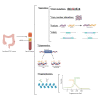ctDNA to Guide Adjuvant Therapy in Localized Colorectal Cancer (CRC)
- PMID: 34201274
- PMCID: PMC8226638
- DOI: 10.3390/cancers13122869
ctDNA to Guide Adjuvant Therapy in Localized Colorectal Cancer (CRC)
Abstract
Currently, the standard treatment for patients with localized colorectal cancer (CRC) includes surgical resection followed by adjuvant chemotherapy based on clinicopathological features. Recurrence risk stratification in those patients is of utmost importance to guide clinicians to avoid both under- and overtreatment. Recently, the concept of minimal residual disease (MRD) has emerged as the detection of circulating tumor DNA (ctDNA) carrying tumor-specific genomic or epigenomic alterations in the bloodstream of patients after surgery. Emerging studies described how the detection of MRD is a powerful prognostic biomarker to identify patients at higher risk of recurrence and who will potentially benefit the most from a systemic adjuvant treatment. Based on that unprecedented finding, several clinical trials involving stage II and III CRC patients are ongoing evaluating the impact of ctDNA guided treatment by escalating or deescalating adjuvant chemotherapy based on ctDNA MRD detection. This review provides a critical overview of current perspectives of liquid biopsy in early-stage CRC including technical, biological, and clinical key points, as well as ongoing ctDNA-based clinical trials that ultimately aim to improve clinical outcomes of patients with CRC.
Keywords: cancer detection; circulating tumor DNA; colorectal cancer; liquid biopsy; minimal residual disease; next-generation sequencing.
Conflict of interest statement
J.V. received honoraria for advisory role, speaker or travel grants from Amgen, Hoffman La-Roche, Merck-Serono, Novartis, and Sanofi. C.M. received honoraria for advisory role, speaker or research grants (past 5 years): Amgen, Biocartis, Bristol Myers Squibb, Guardant-Health, Merck-Serono, Hoffman La-Roche, Sanofi Aventis. C.F.-R. received honoraria for speaker from Merck and consultancy from Roche. L.M. declares no conflict of interest.
Figures




Similar articles
-
Finding Waldo: The Evolving Paradigm of Circulating Tumor DNA (ctDNA)-Guided Minimal Residual Disease (MRD) Assessment in Colorectal Cancer (CRC).Cancers (Basel). 2022 Jun 23;14(13):3078. doi: 10.3390/cancers14133078. Cancers (Basel). 2022. PMID: 35804850 Free PMC article. Review.
-
The Promise of Circulating Tumor DNA (ctDNA) in the Management of Early-Stage Colon Cancer: A Critical Review.Cancers (Basel). 2020 Sep 29;12(10):2808. doi: 10.3390/cancers12102808. Cancers (Basel). 2020. PMID: 33003583 Free PMC article. Review.
-
The Future of ctDNA-Defined Minimal Residual Disease: Personalizing Adjuvant Therapy in Colorectal Cancer.Clin Colorectal Cancer. 2022 Jun;21(2):89-95. doi: 10.1016/j.clcc.2022.03.004. Epub 2022 Mar 26. Clin Colorectal Cancer. 2022. PMID: 35450837 Free PMC article. Review.
-
ctDNA guided adjuvant chemotherapy versus standard of care adjuvant chemotherapy after curative surgery in patients with high risk stage II or stage III colorectal cancer: a multi-centre, prospective, randomised control trial (TRACC Part C).BMC Cancer. 2023 Mar 20;23(1):257. doi: 10.1186/s12885-023-10699-4. BMC Cancer. 2023. PMID: 36941575 Free PMC article. Clinical Trial.
-
Circulating tumor DNA guided adjuvant chemotherapy in stage II colon cancer (MEDOCC-CrEATE): study protocol for a trial within a cohort study.BMC Cancer. 2020 Aug 20;20(1):790. doi: 10.1186/s12885-020-07252-y. BMC Cancer. 2020. PMID: 32819390 Free PMC article.
Cited by
-
Time for a lead-time definition? Author response to 'Why the length of recurrence free survival or "lead-times" can be misleading. Comment on: Callesen LB, Takacova T, Hamfjord J, et al. Circulating DNA in patients undergoing loco-regional treatment of colorectal cancer metastases: a systematic review and meta-analysis'.Ther Adv Med Oncol. 2023 Mar 17;15:17588359231156393. doi: 10.1177/17588359231156393. eCollection 2023. Ther Adv Med Oncol. 2023. PMID: 36950273 Free PMC article. No abstract available.
-
A Review of the Early Detection of Colon Cancer and the Role of Circulating Tumor DNA.Cureus. 2025 May 19;17(5):e84394. doi: 10.7759/cureus.84394. eCollection 2025 May. Cureus. 2025. PMID: 40535389 Free PMC article. Review.
-
Circulating Tumor DNA as a Minimal Residual Disease Assessment and Recurrence Risk in Patients Undergoing Curative-Intent Resection with or without Adjuvant Chemotherapy in Colorectal Cancer: A Systematic Review and Meta-Analysis.Int J Mol Sci. 2023 Jun 16;24(12):10230. doi: 10.3390/ijms241210230. Int J Mol Sci. 2023. PMID: 37373376 Free PMC article.
-
[Current trends in liquid biopsy and diagnostics-contributions from ASCO and ESMO 2022].HNO. 2023 Jul;71(7):425-430. doi: 10.1007/s00106-023-01303-z. Epub 2023 May 19. HNO. 2023. PMID: 37208494 Free PMC article. Review. German.
-
Clinical significance of genomic sequencing of circulating tumour cells (CTCs) in cancer.J Liq Biopsy. 2023 Dec 28;3:100135. doi: 10.1016/j.jlb.2023.100135. eCollection 2024 Mar. J Liq Biopsy. 2023. PMID: 40026568 Free PMC article. Review.
References
-
- Argilés G., Tabernero J., Labianca R., Hochhauser D., Salazar R., Iveson T., Laurent-Puig P., Quirke P., Yoshino T., Taieb J., et al. Localised Colon Cancer: ESMO Clinical Practice Guidelines for Diagnosis, Treatment and Follow-Up. Ann. Oncol. 2020:S0923753420399324. doi: 10.1016/j.annonc.2020.06.022. - DOI - PubMed
-
- Schmoll H.-J., Twelves C., Sun W., O’Connell M.J., Cartwright T., McKenna E., Saif M., Lee S., Yothers G., Haller D. Effect of Adjuvant Capecitabine or Fluorouracil, with or without Oxaliplatin, on Survival Outcomes in Stage III Colon Cancer and the Effect of Oxaliplatin on Post-Relapse Survival: A Pooled Analysis of Individual Patient Data from Four Randomised Controlled Trials. Lancet Oncol. 2014;15:1481–1492. doi: 10.1016/S1470-2045(14)70486-3. - DOI - PMC - PubMed
-
- Zaniboni A., Labianca R., Marsoni S., Torri V., Mosconi P., Grilli R., Apolone G., Cifani S., Tinazzi A. A Randomized Trial of Adjuvant 5-Fluorouracil and Folinic Acid Administered to Patients with Colon Carcinoma—Long Term Results and Evaluation of the Indicators of Health-Related Quality of Life. Cancer. 1998;82:2135–2144. doi: 10.1002/(SICI)1097-0142(19980601)82:11<2135::AID-CNCR7>3.0.CO;2-U. - DOI - PubMed
Publication types
LinkOut - more resources
Full Text Sources

